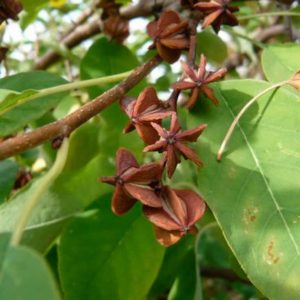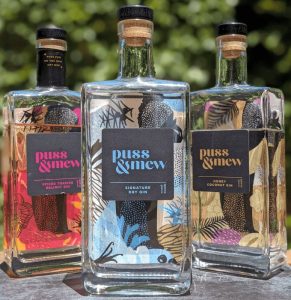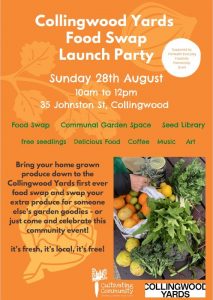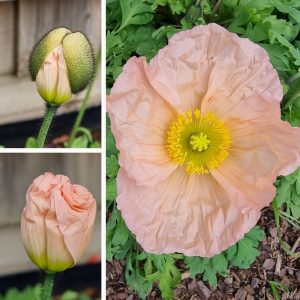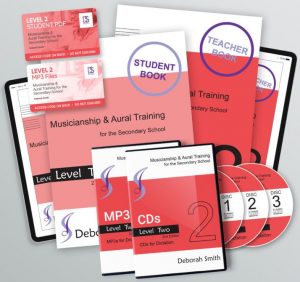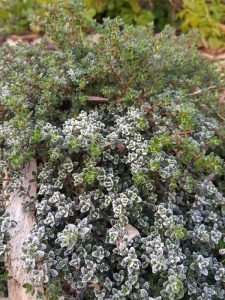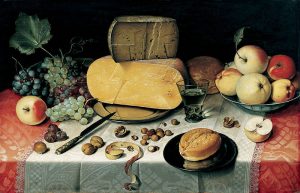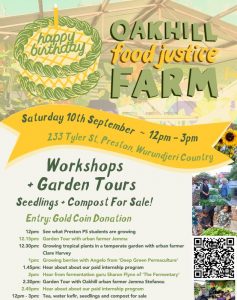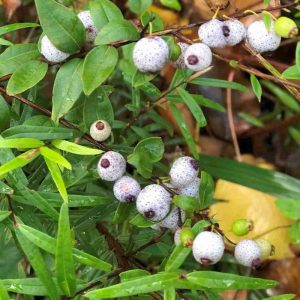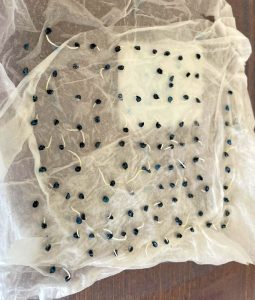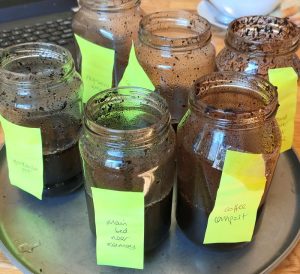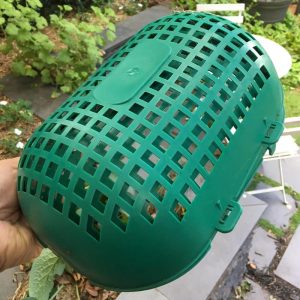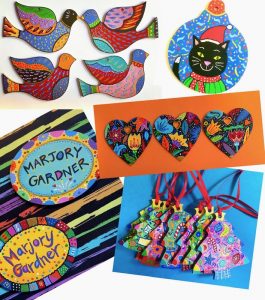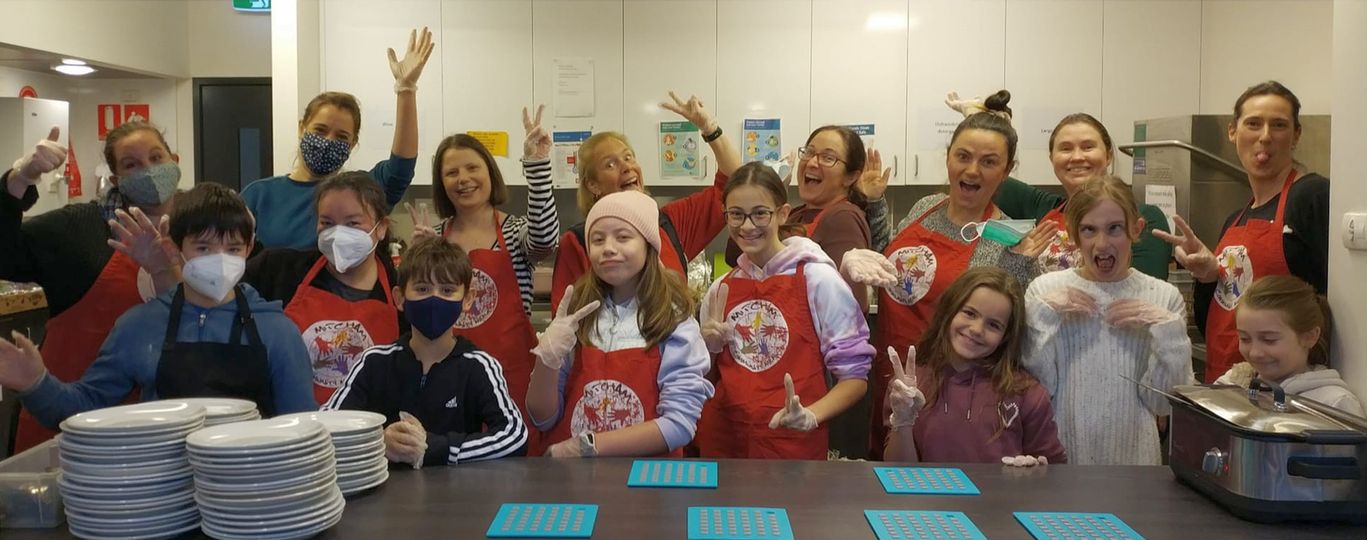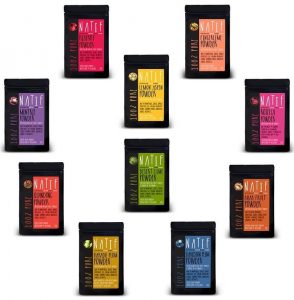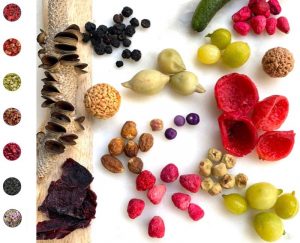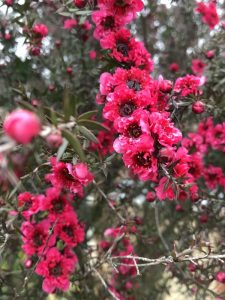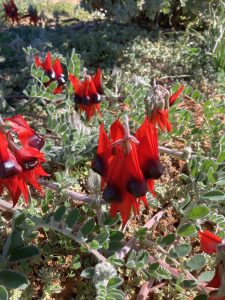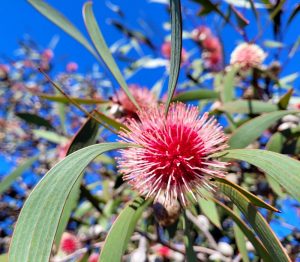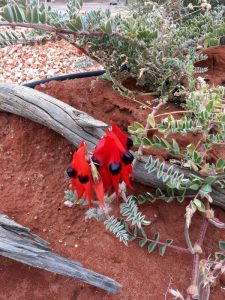Thanks to the people who have contributed to this week’s newsletter: Ann Stanley, Bruce Plain, Carol Woolcock, Megan Goodman, Pauline Webb and Robin Gale-Baker.
Rosella/roselle (by Robin Gale-Baker)
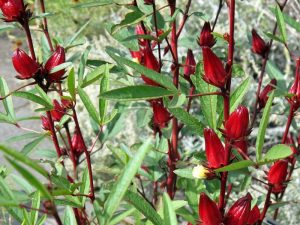 Rosella (Hibiscus sabdariffa), known as Roselle in countries other than Australia, is not an Australian native (as many people seem to think) but from West Africa. It is a bush that produces ruby red calyxes that make tasty jams or cordials, leaves that are used in tea making and salads, and an outer stem covering that can be stripped and used like jute. There are many good recipes for jams and cordials on the internet.
Rosella (Hibiscus sabdariffa), known as Roselle in countries other than Australia, is not an Australian native (as many people seem to think) but from West Africa. It is a bush that produces ruby red calyxes that make tasty jams or cordials, leaves that are used in tea making and salads, and an outer stem covering that can be stripped and used like jute. There are many good recipes for jams and cordials on the internet.
Seed raising
In Melbourne’s climate, it is best to raise the seeds in pots so that the plants are well established by the time the soil temperature has reached at least 20degC. Plant three seeds per pot 1cm deep in seed raising mix, keep well watered and, later, thin out leaving the strongest. Sow seeds in mid-August. The seedlings will grow into bushes that can be as wide as 1.5 metres and as high as 2 metres.
Position, bed and water
In our climate, plant the seedlings in the hottest part of the garden in full sun, preferably in a raised bed or wicking bed to keep the lower branches off the soil and out of reach of pests. Wicking beds are ideal as rosella is a plant requiring heavy watering (at least every 2-3 days if not in a wicking bed).
Soil and planting
Rosella needs rich soil with plenty of compost and must be well drained. They are heavy feeders. When the buds are forming, apply more compost. If planting in a garden bed, plants can be as far as 1 metre apart. In a raised bed, plant them 50cm apart and the branches will intersperse a bit like a hedge. You will need to plant 6-7 plants to get a decent harvest. Plant out in mid-late October. Rosella needs a long summer – at least 6 months of hot sun – so there is little leeway for plants to mature if planted later than October. The calyxes develop as the days shorten. There are two flushes of calyxes – the first is sometimes light but the second will be heavy and occurs when the plant puts all its energy into reproducing before dying off. Technically, it is a perennial but treat it as an annual as cold weather and frost kill it.
Harvesting and preparing
When the calyxes are 25-30cm in diameter, they are ready to harvest. Use secateurs or sharp scissors to cut them as the stems are quite thin and fragile. Store them in the fridge until you have enough to use. Inside the calyx is a big seed pod that needs to be removed. Peel the petals of the calyx from the seed pod but keep the seed.
Seed saving
Either save the seed when you prepare the calyxes for processing or leave some calyxes on the plants to dry (just as you would with peas or broad beans). The seed comes out easily: just tap the calyx on to your hand and it will fall out. Not all seed is equally viable so it is worth planting extra to ensure sufficient plants. Seeds are sold by Diggers, The Seed Collection, Eden Seeds and Seed Freaks in Tasmania. Read more of Robin’s articles on our website about how to grow various herbs.
Every newsletter needs a good picture
 A little imagination with olives, noodles and mozzarella and you’re no longer allowed to cook dinner.
A little imagination with olives, noodles and mozzarella and you’re no longer allowed to cook dinner.
Some articles for you to read
The history of Pentridge Community Garden
Pentridge Community Garden in Coburg is roughly 6 years old. Andrew and Kerry Ogbourne recently wrote an article about its history.
The Fermentary
The Fermentary is a shop in Fitzroy North where they make and sell a wide variety of fermented products. Read their recent interview with Melbourne Farmers’ Markets.
The Part-time Gardener
The Part-time Gardener is a website by someone called Amanda, who says: “Five days a week I run my own business, glued to a laptop. On weekends I dig in the dirt and make sure bees are happy.” Amanda recently wrote an interesting article entitled Is gardening ‘elitist’?. Thanks for the heads up, Bruce Plain!
What seeds to plant in September
Here is a list (see the planting guide for more detail):
CucurbitsCucumber |
Other warm season veggiesBasil |
Leafy greensLettuce |
RootsBeetroot |
Other veggiesAsparagus |
It’s Spring time! Time to get planting! I try and plant all my warm season veggie seeds in September – that way, if they fail to germinate, I can try again in October.
Read Helen Simpson’s articles on our website about growing basil, chillies, cucurbits, tomatoes and Spring veggie garden preparation more generally.
Read Robin Gale-Baker’s articles on our website about growing eggplants & capsicums and tomatoes.
Meg’s garden this month
With seedlings already underway in the greenhouse, it is time to plan and assess. Each year I find that I have planted too many beds with things that will limit my opportunities for planting in the new season (e.g. turnips, broad beans and onions). I need to decide if some of the broad beans need to be sacrificed for spring planting. I know that, if the veggie beds are cleared, then Spring planting is just around the corner. The smell of freshly mown onion weed permeates the air as I spend the day clearing small areas of the garden. This is daunting when considering the large bundles that I am creating of chickweed, cleavers, flick weed, radium, creeping oxalis, flat weed, dandelion, winter grass, etc. Some of these weeds (e.g. chickweed and cleavers) are edible but please take care. Chickweed, for example, can be confused with radium (aka milkweed), which is poisonous.
This month I am:
- Weeding.
- Turning compost into cleared beds.
- Admiring the blossom on the fruit trees.
- Enjoying the rosemary with its little purple flowers.
Rosemary and thyme biscuits
about a half tablespoon rosemary and thyme, finely chopped, and a few rosemary flowers 100g butter, diced 150g plain flour ½ teaspoon paprika (smoked is nice) 1 egg 80g grated cheese 1 tablespoon water pinch of salt and pepper to taste Heat the oven to 180degC. Place the butter, flour, cheese, salt and pepper in a food processor and mix until the butter has been incorporated. Add water and process to just bring the mix together into a soft dough. Roll into balls and press onto a lined baking tray (as for biscuits). Brush with lightly beaten egg and scatter with herbs and flowers. Bake for about 10 minutes or until just coloured. Cool on tray for about 2 mins then move to a rack. Read more of Megan Goodman’s recipes on our website.
Not food-related but interesting
 More on oriental poppies
More on oriental poppies
From Carol Woolcock: “Our oriental poppies must originally have been dropped by a passing bird and they now self-seed every year.“
Mint bushes in Hurstbridge
Last week’s Gardening Australia featured a segment on Miriam Ford’s collection of native mint bushes (aka prostantheras) in her Hurstbridge garden. Watch the video.
Some of our articles you might have missed over the last month
- Chinese star anise (Illicium verum) by Jaimie Sweetman.
- Growing midyim berries (by Robin Gale-Baker).
Which link was clicked most times in the last newsletter?
The most popular link in the last newsletter was the Facebook page with Dan Palmer memories and tributes.
 Joke (or pun) of the week
Joke (or pun) of the week
I used to live hand to mouth. Do you know what changed my life? Cutlery. Read more jokes.
Regular activities over the coming week
Farmers’ markets
- Saturday: Abbotsford and Coburg.
- Sunday: Alphington, Carlton and Eltham.
Food swaps
For ‘technical’ reasons, the Warrandyte Food Swap scheduled for Saturday will not take place.
- Saturday: Bayswater North, Brunswick East, Collingwood, Fitzroy, Heidelberg West and Rosanna.
- Sunday: Blackburn, Montmorency and Regent (Reservoir).
Community gardens
- Thursday: Diamond Valley Library (Greensborough), Edible Hub (Hurstbridge), SEEDs (Brunswick) and Whittlesea.
- Friday: Reynard Street (Coburg) and West Brunswick.
- Saturday: Links (Lalor), Macleod and Thrive (Diamond Creek).
- Sunday: Fawkner Food Bowls, Northcote Community, Pentridge (Coburg) and Regent (Reservoir).
- Monday: Panton Hill, SEEDs (Brunswick) and Whittlesea.
- Tuesday: Watsonia Library.
- Next Wednesday: Living & Learning Eltham, Macleod, Newton Street (Reservoir), Span (Thornbury) and Sylvester Hive (Preston).
Upcoming face-to-face events – not cooking
Introduction into wines; Saturday, 3rd September, 3-5pm; $32 ($16 per hour); Northcote.
Broc will take you through the basics of wine, from how to taste to the processes behind your favourite drop. The session will include 8 very different wines to demonstrate the difference in grapes and wine making techniques.
Chocolate and beer masterclass; Thursday, 8th September, 7-9pm; $53 ($27 per hour); Preston.
6 chocolates will be matched with 6 beers. Jointly hosted by Moon Dog Brewing and Birdsnake.
How to use sustainable processes for clean up in every day kitchens; Saturday, 10th September, 9.30-11am; free; Lilydale.
Ellen Clarke will show you some sustainable tips and tricks for cleaning up and dealing with waste in the kitchen. She will cover: waste reduction; food waste reduction; DIY cleaning products; get more for your money; and ways to use waste. Make your own sustainable cleaning product to take home with you.
Warm season planting workshop; Saturday, 10th September, 10.30am-12.30pm; free; Lilydale.
The topics to be discussed will include: selecting and propagating appropriate warm season crops; soil & garden preparation; crop rotation & successional plantings; summer green manuring; watering strategies; and managing healthy plants for high yield.
Compost, worm farms and Bokashi bins (advanced); Saturday, 10th September, 1.30-3pm; free; Forest Hill.
This workshop is for those who have already started composting at home, have at least a basic knowledge of composting, and want to learn more about combining or adding to their existing systems. You will look at: how to set up both hot and cold composting systems; how to run successful above ground and inground worm farms; how to run multiple composting systems and their benefits; and how to use Bokashi Bin waste in your worm farms and gardens.
Farming for our future (ages 5 to 8); Tuesday, 20th September, 10am-midday; free; Brunswick East.
This workshop is aimed at children aged 5 to 8 years and each child must be accompanied by an adult guardian. Explore the Honey Lane Organic Farm, meet some chickens, make a recycled pot and propagate your own plant to take home.
Cheese and beer masterclass; Thursday, 22nd September, 7-9pm; $64 ($32 per hour); Abbotsford.
6 cheeses will be matched with 6 beers. Jointly hosted by Moon Dog Brewing and Cheese Culture.
Beeswax wraps; Saturday, 1st October, 3.30-5.30pm; $75 ($38 per hour); Panton Hill.
Jenna will show you how to create your own beeswax wraps, which will change the way you store food. You will make and take home a selection of small and medium sized wraps.
Veggie gardening for beginners; Thursday, 6th October, 6.30-9pm; $55 ($22 per hour); Bulleen Art and Garden Nursery.
What you will learn: how to set up and prepare a vegetable garden; how to select, plant and care for crops; and how to grow veggies in the ground, in raised beds and in pots. Presented by Tess. This class will teach you everything you need to know to grow delicious produce in your own backyard. They will cover all of the veggie gardening basics, from setting up your patch to harvesting.
Willsmere Kitchen Garden party; Saturday, 8th October, 2-5pm; free; Kew.
Join them for a day of food, music and fun for all the family. Devonshire tea by Ed’s Kitchen, smoothies by Bike n’ Blend, music by Three Legged Dog (and friends), face painting, etc. Click her to read about the kitchen garden
Growing fruit and veggies in small spaces; Thursday, 13th October, 6.30-9pm; $50 ($20 per hour); Bulleen Art and Garden.
What you will learn: which produce plants are suitable to grow in small areas; coping with shade and sun for produce growing; and how to make the most of any available space for growing produce. Presented by Kirsteen Macleod. Topics will include fruit, vegetables and berries for small spaces, growing produce in pots and containers, maximising productivity in any size space and plant selection.
In September
- Grazing board making workshop for women; Thursday, 1st September, 6-8pm; $189 ($95 per hour); Richmond.
- Wild Fire Wines & Arquiteka cider tasting @ Underwood; Thursday, 1st September, 6.30-8pm; $45 ($30 per hour); Fitzroy North.
- Your edible garden, springing into spring! (3 sessions); Thursdays, 1st, 8th and 15th September, each 10am-midday; $62 ($31 per hour); Forest Hill
- Complete urban farmer (14 sessions); weekly, starting Friday, 2nd September, 9am-3pm; $880 ($10 per hour); CERES.
- The power of rocket stove technology – demonstration evening; Friday, 2nd September, 7.30-9pm; $25 ($16 per hour); Research.
- The art of espalier; Saturday, 3rd September, 9.30am-12.30pm; $55 ($18 per hour); Bulleen Art and Garden Nursery.
- The power of rocket stove technology – workshop build; Saturday, 3rd September, 10am-5pm; $75 ($11 per hour); Templestowe.
- Beginners workshop in composting, worm farms and Bokashi bins; Saturday, 3rd September, 10.30am-midday; free; Forest Hill.
- Edible weeds walk; Saturday, 3rd September, 10.30am-12.30pm; $25 ($13 per hour); Brunswick East.
- Edible weeds walk; Saturday, 3rd September, 1.30-3.30pm; $25 ($13 per hour); Brunswick East.
- Setting up a worm farm; Saturday, 3rd September, 2-3.30pm; free; Edendale.
- Introduction into wines; Saturday, 3rd September, 3-5pm; $32 ($16 per hour); Northcote.
- Caring for backyard chooks; Sunday, 4th September, 2-4pm; $25 ($13 per hour); Edendale.
- Salami day at the Preston Market; Wednesday, 7th September, 8am-3pm; free; Preston.
- Complete urban farmer (14 sessions); weekly, starting Wednesday, 7th September, 9am-3pm; $880 ($10 per hour); CERES.
- Chocolate and beer masterclass; Thursday, 8th September, 7-9pm; $53 ($27 per hour); Preston.
- Permaculture Design Course (80 hours); on Thursdays from 8th September to 8th December; $595; Kinglake.
- How to use sustainable processes for clean up in every day kitchens; Saturday, 10th September, 9.30-11am; free; Lilydale.
- Gardening in small spaces; Saturday, 10th September, 10am-3pm; $115 ($23 per hour); CERES.
- Warm season planting workshop; Saturday, 10th September, 10.30am-12.30pm; free; Lilydale.
- Oakhill Farm’s 1st birthday party; Saturday, 10th September, midday-3pm; gold coin donation; Preston.
- Composting and worm farm workshop; Saturday, 10th September, 1-3pm; free; Preston.
- Compost, worm farms and Bokashi bins (advanced); Saturday, 10th September, 1.30-3pm; free; Forest Hill.
- SEEDs Soup Festival; Sunday, 11th September, 11am-5pm; free; Brunswick.
- Getting ready for the Queensland fruit fly season; Wednesday, 14th September, 8-10pm; free; Doncaster East.
- Introduction to beekeeping; Thursday, 15th September, 11am-midday; free; Greensborough.
- Introduction to beekeeping (2 sessions); Saturday, 17th September, 9.30am-4.30pm and Saturday, 24th September, 10.30am-12.30pm; $225 ($25 per hour); Blackburn North.
- Tequila & Mezcal Festival; Saturday, 17th September, 5.30pm-midnight; $27 (general admission) or $79 (includes tequilas and tacos); Preston.
- An intro to beekeeping; Sunday, 18th September, 9.30am-12.30pm; $55 ($18 per hour); Bulleen Art and Garden Nursery.
- Farming for our future (ages 5 to 8); Tuesday, 20th September, 10am-midday; free; Brunswick East.
- Backyard chooks for families; Tuesday, 20th September, 2-4pm; $10 per child (accompanying adults are free); Edendale.
- Cow milking and butter making; Wednesday, 21st September, 2-2.45pm; free; Watsonia.
- Cow milking and butter making; Wednesday, 21st September, 2.45-3.30pm; free; Watsonia.
- Mushroom growing masterclass; Thursday, 22nd September, 6.30-9.30pm;$145 ($48 per hour); Collingwood.
- Cheese and beer masterclass; Thursday, 22nd September, 7-9pm; $64 ($32 per hour); Abbotsford.
- Spring veggie gardening; Sunday, 25th September, 9.30-10.15am; $15 (reimbursable at the nursery); Diamond Creek.
- Produce in pots; Sunday, 25th September, 9.30am-12.30pm; $55 ($18 per hour); Bulleen Art and Garden Nursery.
- Foraging course (5 sessions); 5 Wednesdays starting 28th September, each 6-7.30pm; $330 ($44 per hour); Coburg.
- Heal with food – heart health; Thursday, 29th September, 6.30-8.30pm; free; Eltham.
- The joy of backyard chooks; Thursday, 29th September, 6.30-9pm; $50 ($20 per hour); Bulleen Art and Garden Nursery.
In October
- Edible weeds walk; Saturday, 1st October, 10.30am-12.30pm; $25 ($13 per hour); Brunswick East.
- Edible weeds walk; Saturday, 1st October, 1.30-3.30pm; $25 ($13 per hour); Brunswick East.
- Beeswax wraps; Saturday, 1st October, 3.30-5.30pm; $75 ($38 per hour); Panton Hill.
- Introduction to growing microgreens; Sunday, 2nd October, 10am-1pm; $60 ($20 per hour); Preston.
- Growing nutrient dense food; Sunday, 2nd October, 10am-3pm; $115 ($23 per hour); CERES.
- Composting at home; Wednesday, 5th October, 10-11am; free; Croydon.
- Worm farm workshop; Wednesday, 5th October, 11.15am-12.15pm; free; Croydon.
- Digestion composting workshop; Wednesday, 5th October, 12.30-1.30pm; free; Croydon.
- Veggie gardening for beginners; Thursday, 6th October, 6.30-9pm; $55 ($22 per hour); Bulleen Art and Garden Nursery.
- Growing Spring veggies; Saturday, 8th October, 9.30am-3pm; $85 ($15 per hour); Eltham.
- Edible weeds; Saturday, 8th October, 10am-midday; $50 ($25 per hour); CERES.
- Basic inoculation workshop; Saturday, 8th October, 10am-midday; $87 ($44 per hour); Alphington.
- Willsmere Kitchen Garden party; Saturday, 8th October, 2-5pm; free; Kew.
- In-depth mushroom cultivation workshop; Sunday, 9th October, 10am-4pm; $165 ($28 per hour); Alphington.
- Getting started with organic veggie gardening; Tuesday, 11th October, 6.30-8.30pm; free; Doncaster.
- Asian summer vegetables; Wednesday, 12th October, 8-10pm; free; Doncaster East.
- Practical food gardening; Thursday, 13th October, 10am-12.30pm; free; Forest Hill.
- Growing fruit and veggies in small spaces; Thursday, 13th October, 6.30-9pm; $50 ($20 per hour); Bulleen Art and Garden.
- Growing great tomatoes; Saturday, 15th October, 10am-3pm; $115 ($23 per hour); CERES.
- Home composting for beginners; Saturday, 15th October, 2-3.30pm; free; Edendale.
- Growing mushrooms at home; Saturday, 15th October, 10am-12.30pm; $95 ($38 per hour); Alphington.
- Healthy soil for produce gardening; Tuesday, 18th October, 6.30-8.30pm; free; Doncaster.
- Indigenous food, fiber and medicine; Wednesday, 19th October, 6.30-8.30pm; free; Macleod.
Regular events
- Bakery Hill whisky distillery tour and tasting; various Sundays, various times; $64 ($43 per hour); Bayswater North.
- Beekeeping workshop; roughly once a month; $85 ($34 per hour); Brunswick East.
- Beginning beekeeping course; Various Saturdays, 9.30am-4pm; $260 ($40 per hour); Edendale.
- Carlton aperitvio food tour; various Fridays, 5-7pm; $89 ($45 per hour); Carlton.
- Cocktail workshop; Saturdays, at 2pm and again at 5pm; $55 ($37 per hour); Northcote.
- Eltham trials (walking food tour); various Saturday mornings and Thursday evenings; $65 ($22 per hour); Eltham.
- Flavours of Coburg food tour; various Saturdays, 10am-1pm; $49 ($16 per hour); Coburg.
- Gin making masterclass; most Saturdays, 10am-1pm; $175 ($58 per hour); Nunawading.
- Ratio Cocoa Roasters behind the scenes chocolate factory tour; various Fridays and Saturdays; $15 ($10 per hour); Brunswick.
Upcoming face-to-face events – cooking
Sourdough bread making; Saturday, 1st October, 9am-midday; $74 ($25 per hour); Panton Hill.
Learn how to make sourdough bread. You will take home both a crusty loaf and your own sourdough starter. Tutor Jenna Farrington-Sear, who can also give you ongoing support and advice if you need it.
Kombucha and kefir; Saturday, 1st October, 1-3pm; $55 ($28 per hour); Panton Hill.
Jenna will show you how to make your own kombucha and kefir.
Pink hands; Saturday, 1st October, 2-4pm; $195 ($98 per hour); Fitzroy North.
This is a gorgeously messy class where you will get your hands pink and learn how to best love your guts. You will make a ruby pink sauerkraut and a wild rhubarb fizz. Go home with 2 jars full plus a couple of bottles for second fermenting.
In September
- Italian cooking (2 sessions); Thursday, 1st September and Thursday, 8th September, both 6-9pm; $190 ($32 per hour); Surrey Hills.
- Turkish vegetarian cooking; Friday, 2nd September, 6.30-8.30pm; $65 ($33 per hour); Balwyn North.
- Lovely lemons; Wednesday, 7th September, 1.30-3pm; $5; Greensborough.
- Blokes in the kitchen; Sunday, 9th September, 9am-midday; $40 ($13 per hour); Surrey Hills.
- Sourdough bread; Saturday, 10th September, 10am-12.30pm; $75 ($30 per hour); Park Orchards.
- Growing, cooking, sharing – a harmony of tastes cooking class; Saturday, 10th September, 10am-1pm; $15; Forest Hill.
- Cultural cooking – Indian curries; Saturday, 10th September, 11am-1pm; $50 ($25 per hour); Alphington.
- Cheese making with Tina van Kooten; Wednesday, 14th September, 10am-3pm; $90 ($18 per hour); Yarra Glen.
- Middle Eastern cooking; Thursday, 15th September, 10.30am-1.30pm; $80 ($27 per hour); Park Orchards.
- Soft goat cheese curd and goat camembert cheese; Sunday, 18th September, 10am-4pm; $170 ($28 per hour); CERES.
- Fermentation for beginners; Thursday, 22nd September, 7-10pm; $112 ($37 per hour); Richmond.
- An artisan vegan chocolate dessert class; Sunday, 25th September, 10am-1pm; $154 ($51 per hour); Alphington.
- Introduction to fermenting at home; Sunday, 25th September, 10am-1pm; $70 ($23 per hour); CERES.
In October
- Sourdough bread making; Saturday, 1st October, 9am-midday; $74 ($25 per hour); Panton Hill.
- Kombucha and kefir; Saturday, 1st October, 1-3pm; $55 ($28 per hour); Panton Hill.
- Pink hands; Saturday, 1st October, 2-4pm; $195 ($98 per hour); Fitzroy North.
- Seasonal home cooking – springtime classics (3 sessions); Sundays, 2nd, 9th and 16th October, each 10am-1pm; $110 ($37 per hour); Forest Hill
- Seasonal home cooking – springtime classics (3 sessions); Wednesdays, 5th, 12th and 19th October, each 10am-1pm; $110 ($37 per hour); Forest Hill
- Truffle and praline workshop; Saturday, 8th October, 6-10pm; $180 ($45 per hour); Blackburn
- Sourdough basics; Wednesday, 12th October, 6.30-8pm; $120 ($80 per hour); Collingwood.
- Prepare and share – dishes from around the globe; Thursday, 13th October, 6-8pm; $16 ($8 per hour); Forest Hill
- Blokes in the kitchen (3 sessions); on Fridays, 14th October, 11th November and 9th December, each 9am-midday; $120 ($13 per hour); Surrey Hills.
- Cultural cooking – Indian condiments; Saturday, 15th October, 11am-1pm; $50 ($25 per hour); Alphington.
- Triple cream brie cheese; Sunday, 16th October, 10am-4pm; $170 ($28 per hour); CERES.
Regular classes
- @drool.aus (Italian); various Saturdays and Sundays; roughly $100 ($40 per hour); Fitzroy and Northcote.
- Al dente cooking (Italian); most Saturdays, 9am-1pm; $155 ($39 per hour); Chirnside Park.
- Artisan bread making; Various Sundays, 8am-2pm; $220 ($37 per hour); Abbotsford.
- Become a junior chocolatier; various days and times; $40 ($53 per hour); Yarra Glen.
- Beginners bread making; various Sundays, 8am-2pm; $220 ($37 per hour); Abbotsford.
- Chocolate discovery class; various days and times; $48 ($48 per hour); Yarra Glen.
- Chocolate making workshop; various Thursdays, Fridays and Saturdays; $152 ($38 per hour); Blackburn.
- Kombucha brewing workshop; monthly on the last Thursday, 7-11pm; $54 ($14 per hour); Brunswick.
- La Cucina di Sandra (Italian); various evenings, 6.30-10.30pm; $105 ($26 per hour); Richmond.
- Nonna & Mum’s cooking class; monthly on the 4th Thursday, 6-10pm; $20 ($7 per hour); Thornbury.
- Otao Kitchen (various classes); various dates, times and prices; Richmond.
- Rosa’s traditional Italian cooking class; various Saturdays and Sundays; $155 ($39 per hour); Bundoora.
- Sourdough bread workshop; Various Saturdays, 9-11.30am; $185 ($74 per hour); Brunswick East.
- The ultimate biscuit class; various Tuesdays, 10am-3pm; $162 ($32 per hour); Blackburn.
- Wild fermentation class and edible forest tour; monthly on the 1st Saturday, 10am-1pm; $85 ($28 per hour); Dixons Creek.

